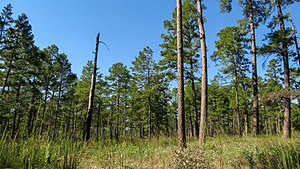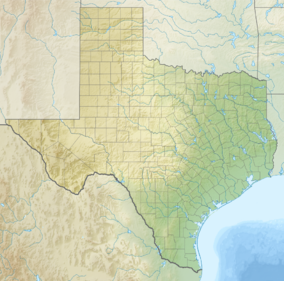| I. D. Fairchild State Forest | |
|---|---|
 Shortleaf Pine Savanna in the Forest Shortleaf Pine Savanna in the Forest | |
 | |
| Location | Cherokee County, TX, USA |
| Nearest city | Rusk |
| Coordinates | 31°46′58″N 95°21′54″W / 31.7828°N 95.3650°W / 31.7828; -95.3650 |
| Area | 2,760 acres (11.2 km) |
| Established | 1926 |
| Governing body | Texas A&M Forest Service |
| Website | https://tfsweb.tamu.edu/fairchild-state-forest/ |
I.D. Fairchild State Forest is a 2,760-acre (1,120 ha) nature preserve in Cherokee County, Texas. It is the largest state forest in Texas and includes 10 miles of hiking trails. The main unit is located just west of the community of Maydelle on Texas State Highway 84. It is open to the public for hiking, horseback riding, picnicking, wildlife viewing, and biking. The Texas A&M Forest Service uses the area for demonstration and research as well as to conserve southern yellow pine ecosystems. The Texas State Railroad also runs through the forest.
History
Prison Camp

White settlement began in the area surrounding the Forest circa 1840s, but developments in the Forest proper did not begin until the 1900s. Beginning in 1906, the Texas State Railroad was built between Palestine and Rusk. The land that became the Forest was then acquired by the Texas prison system, where a branch prison called Camp Wright was built. Twenty-five years earlier, in 1881, Rusk Penitentiary had been constructed by the state. Prison operators planned on running an iron foundry for revenue at the prison, which required the railway. In 1908, the state built the Minshew State Sawmill on the site, and timber was cut to supply charcoal for the foundry at the penitentiary in Rusk. Forced convict labor was used to construct and operate the foundry and mill until it burned in 1912. 35,000 feet of lumber was processed per day while it was operational. The area remained in the hands of the Prison system until 1926 when it was transferred to the Texas A&M Forest Service.
CCC Camp
Once in the hand of the Forest Service the land was designated State Forest #3. On June 6, 1933, the Civilian Conservation Corps founded a camp in the Forest's main unit. Workers from camp S-54, Company 833, were tasked with fire protection for nearly 300,000 acres of forest in the area. They also with built and maintained roads, telephone poles and lines, fire towers, and sold firewood. The camp was in operation until December 14, 1947. The CCC continued to host meetings in the Forest into the mid 1950s, when most of the buildings were dismantled.
State Forest
In 1956, the state dedicated the Forest to legislator I.D. Fairchild of Lufkin, who died in a car accident in 1928.
Ecology and Wildlife
The bulk of the habitat protected by the Forest are mature stands of open pine savanna, principally made up of shortleaf pine (Pinus echinata), a declining species. Shortleaf pine ecosystems are fire-adapted and support a wide range of biodiversity. Decline of this ecosystem in East Texas is principally due to urbanization and fire-suppression. This habitat supports a clutch of the endangered Red-Cockaded Woodpeckers (Dryobates borealis) in the Forest. Successful reintroduction efforts in the area date back to the 1980s.
Other bird species known to frequent the Forest include woodpeckers, warblers, summer tanagers, buntings, and vireos, according to Texas Parks and Wildlife. Common butterflies include swallowtails, crescents, and painted ladies'. The Forest also hosts a wide diversity of wildflowers including back-eyed susans and dayflowers. The Forest also includes numerous creeks and bottomland hardwood forests.
See also
External links
- Texas Forest Service - I.D. Fairchild State Forest
- Organisms observed in the forest via iNaturalist
- A map of trails in the main unit of the forest
References
- "Learn and Explore | I.D. Fairchild State Forest TFS". tfsweb.tamu.edu. Retrieved September 29, 2022.
- "I.D. Fairchild State Forest – My East Texas". Retrieved September 29, 2022.
- ^ "Texas State Railroad Loop — Texas Parks & Wildlife Department". tpwd.texas.gov. Retrieved September 29, 2022.
- ^ "Learn and Explore | I.D. Fairchild State Forest TFS". tfsweb.tamu.edu. Retrieved September 29, 2022.
- ^ "TSHA | Maydelle, TX". www.tshaonline.org. Retrieved September 29, 2022.
- ^ Larkin, Rachael. "Mewshaw State Sawmill and Maydelle CCC Camp". East Texas History. Retrieved September 29, 2022.
- "The Texas State Railroad". July 9, 2006. Archived from the original on July 9, 2006. Retrieved September 29, 2022.
- Harrison, David (October 16, 2021). "How farmland, timber and oil changed the face of East Texas forever".
- Barbutt, John Wayne (December 2007). "We Were Soil Soldiers; The Civilian Conservation Corps Camps of the Lufkin District": 35–36. ProQuest 304713781 – via ProQuest.
{{cite journal}}: Cite journal requires|journal=(help) - US Forest Service (September 29, 2022). "Sharing the tools to restore shortleaf pine in East Texas" (PDF).
- Conner, Richard N.; Rudolph, D. Craig (1995). "Losses of Red-Cockaded Woodpecker Cavity Trees to Southern Pine Beetles". The Wilson Bulletin. 107 (1): 81–92. ISSN 0043-5643. JSTOR 4163515.